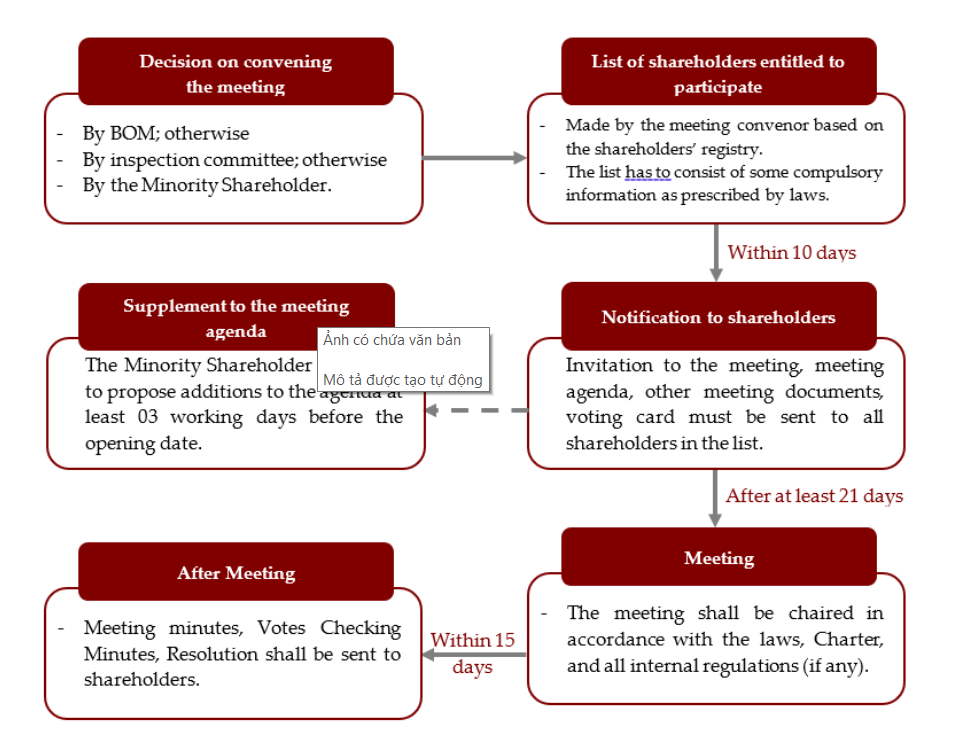Share:
The article concentrates on procedure to convene a General Meeting of Shareholders in a joint stock company and the risk from failure of compliance.
Under Vietnamese laws, the General Meeting of Shareholders including all shareholders (the “GMS”) is the supreme body of a joint stock company. A main and popular option to obtain a decision of the GMS is to hold a meeting in which shareholders shall exercise their voting rights. This article shall address the questions on how to convene a GMS in compliance with applicable rules and regulations; and the legal consequence from noncompliance. It is noted that our discussion is applied to a normal joint stock company and its charter has no different clauses from the current Law on Enterprise No. 59/2020/QH14 (the “LOE 2020”). There maybe have more requirements for a listed or a public company, which we do not discuss in this article.
Pursuant to LOE 2022, the GMS must be convened annually and can be convened irregularly as per request of either the Board of Managers (the “BOM”), the Inspection Committee or the shareholder or group of shareholders owning at least 5% of the ordinary shares of the company (the “Minority Shareholder”) in some specific cases.
In general, the procedure to convene a GMS is as follows:

From the chart, the workload to convene a GMS seems to be enormous whilst each task has to strictly follow a timeframe by laws, culminating in a lengthy and sometimes a costly process.
Is it possible to simplify such process? From our experience, we do not recommend doing so. Pursuant to Article 151.1 of LOE 2020, any material breach of the procedure for either convening the GMS or promulgating a GMS’ resolution may lead to the cancellation of the GMS’ resolution in the even any Minority Shareholder request the court or the arbitration to do so.
In the High People's Court in Da Nang’s judgment in 2018, the Trial Panel stated that:
(i) In regard to the GMS on 22 March 2017, Company O sent the invitation to the shareholder named V owning the ordinary shares accounting for 30.45% of charter capital of Company O on 13 March 2017 without any meeting documents. That is not in compliance with the Law on Enterprises 2014 and the Charter of Company O.
(ii) It is groundless when Company O argued that the Resolution ratified by 100% of the voting shares at the GMS on 22 March 2017 was lawful and effective even if the laws and regulations on the procedures for promulgating such Resolution were not properly followed. Company O did violate the procedures for convening the GMS, which is the ground for the Trial Panel to accept the request of V to cancel the Resolution pursuant to provisions of Law on Enterprises 2014.
In this case, Company O did not meet the timeline to send out invitation and failed to send all meeting documents to its shareholders. This noncompliance adversely affect the rights of shareholders to give opinions and vote as they were not notified of the matter to be discussed in advance to spend time evaluating it comprehensively. Consequently, the resolution passed in the GMS was cancelled.
In short, the regulations on convening the GMS is to ensure the openness and transparency in the governance and operation of a joint stock company and to avoid the abuse of power of the managers and/or majority shareholders. In other words, it is to protect the legitimate rights and interests of all shareholders. Therefore, to minimize the risks in case of any claim against the validity and effectiveness of the resolution ratified by such GMS, we recommend to strictly follow the procedures prescribed by applicable laws, Charter and internal regulations.
***
We hope you find our articles interesting and useful in your everyday business operations. We wish you pleasant reading. Please kindly visit Insight at our official website www.bizlegalgroup.com for more.

